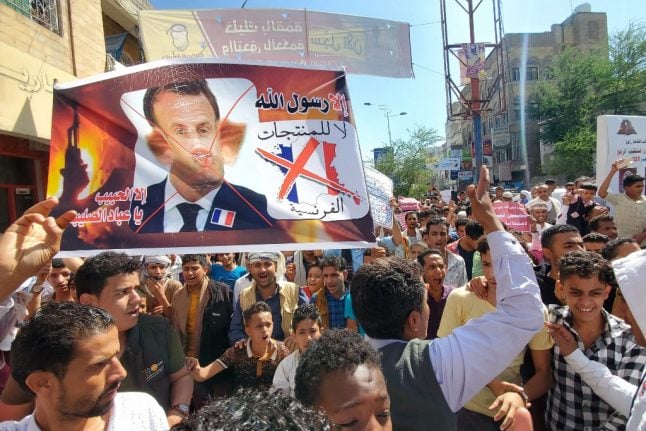What is the proposal?
This is really only a whisper of an idea at present, reported by diplomatic sources, so we have no detail on what such a role might entail, but it comes at the end of a turbulent few weeks for France with protests and calls for boycotts of French products in several Muslim countries.
Does France need to explain itself?
Macron is reportedly concerned that his views on to tackle radical Islam in France and ideas have been misinterpreted and purposefully distorted.
There is certainly a lot of anger towards France from some parts of the Muslim world.
The Iranian press has published caricatures of Macron as the devil and his effigy was burned in Bangladesh where around 50,000 protesters took to the streets. Anti-France street demos also took place in several other countries including Yemen.
There have also been calls to boycott French products, spear-headed by Turkish president Recep Tayyip Erdoğan, with whom Macron has frequently clashed on political and human rights issues. Erdogan earned rebukes from across Europe when he said Macron should have his mental wellbeing checked by doctors.
What has caused the anger?
There are broadly two things that have sparked anger – a speech that Macron gave on October 2nd laying out plans to crack down on Islamic extremism and 'separatism' in France and some of the words uttered by the president and some other ministers in the aftermath of the beheading of schoolteacher Samuel Paty on October 16th by an 18-year-old radicalised Islamist.
Macron's speech referred to Islamism being a problem, rather than Islam itself. In it he laid out measures including a crackdown on foreign funding of mosques and closer scrutiny of the curriculum at private schools and an almost end to home-schooling. These are at the ideas stage and the bill still needs to be presented and debated in the French parliament.
Importantly in the speech he also acknowledged that France had created its own form of 'separatism' by failure to ensure diversity and economic or social mobility in certain parts of the country – notably the deprived banlieues on the outskirts of cities. Many of the people who have committed acts of terror on French soil have been second-generation immigrants who grew up in the poor and tense suburbs of French cities.
He also said that French state schools should teach more Arabic which provoked anger on the right and far-right in France.

A supermarket in Jordan displaying a boycott of French products. Photo: AFP
So where is the misunderstanding?
Taking the second incident first. France – and the rest of the world – was shocked at the brutal beheading in the street of a schoolteacher who had shown Charlie Hebdo magazine's cartoons of the Prophet Mohammed to his civics class as part of a discussion on freedom of speech. It later emerged that this had followed an online hate campaign waged by the father of one of Samuel Paty's pupils (who it turned out wasn't even in the class concerned that day).
At the memorial service, a visibly emotional Macron vowed that France 'would not give up religious cartoons' and would continue to defend the values of a secular republic.
Those words about “not giving up the cartoons” seemed to be the crucial words in provoking anger in Muslim countries, much of which was whipped up by Islamist parties or leaders like Turkey's Erdogan – perhaps to deflect attention from internal issues.
Macron has since clarified that he understands the offence caused to Muslims by these cartoons, and underlined that Charlie Hebdo is a private enterprise, and the publication of the cartoons was not a state-sponsored exercise – but that the state does defend the right to freedom of speech.
On the subject of his speech, some people seem to have misunderstood – or perhaps mistranslated – the difference between Islamism – extremist views – and Islam.
The British newspaper the Financial Times has removed an Op-ed piece that appears to have made this error, and Macron has written a piece for the paper laying out his views.
READ ALSO France is not fighting Islam, only Islamist extremism, says Macron
But while Macron himself has adopted a notably measured tone, the pronouncements of some of his ministers have also been causing concern and anger.
Interior Minister Gérald Darmanin gave a bizarre TV interview where he declared himself 'shocked' that supermarkets have aisles for ethnic food products, while education minister Jean-Michel Blanquer has launched an attack on what he described as Islamo-gauchisme (Islamic leftism) in French universities. Both of their actions have been strongly criticised by many within France.
What next?
At present Macron seems to be taking on the envoy role himself, an addition to the article for the FT he has also given a long interview to Al-Jazeera TV in which he sought to explain more clearly France's position.
Earlier this week a group of leading French Muslim intellectuals wrote an article for Le Monde calling for a halt to the boycott.
Le Monde has translated its op ed on laïcité by a dozen or so imams and Muslim intellectuals and there are people on here who should read it https://t.co/aROG1cnPgb
via Le Monde— jon henley (@jonhenley) November 3, 2020
Whether this is enough to cool the anger and whether France chooses to go ahead with its envoy idea remains to be seen.



 Please whitelist us to continue reading.
Please whitelist us to continue reading.
Because they have realised that they have kicked a hornet’s nest.